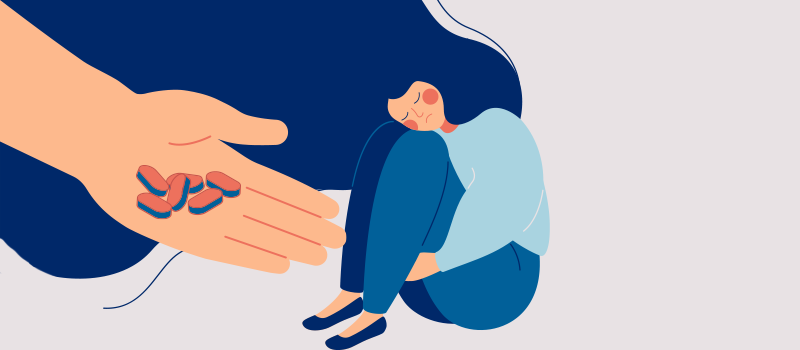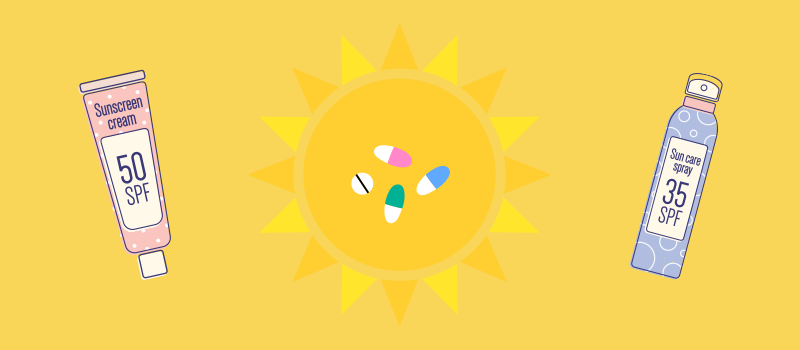What’s the Buzz
The Bee Healthy Blog
Which Medications Are Approved to Treat PTSD?

Did you know June 27 is PTSD Awareness Day? How much do you know about this medical condition that affects an estimated one in 11 people? Please continue reading to learn more about post-traumatic stress disorder (PTSD) and how it is treated, including the types of therapies and medications that can help improve symptoms. If you or a loved one has PTSD, this knowledge may help you better understand what you’re going through and develop effective coping strategies.
What is PTSD?
According to the U.S. Department of Veterans Affairs, post-traumatic stress disorder (PTSD) is a mental health condition that can develop after experiencing or witnessing a significant traumatic event. This event may be something that occurred during active duty in a combat zone, a sexual assault, a physical assault such as a robbery or mugging, a motor vehicle accident, a plane crash, or a natural disaster like a fire or earthquake.
The physical symptoms of PTSD can include severe anxiety, flashbacks, nightmares, and distressing memories of the event. Emotional or psychological symptoms can include detachment from family and friends, becoming emotionally numb, losing interest in previously enjoyable activities, and feeling hopeless about the future. PTSD symptoms can appear soon after the traumatic events or much later, and they can last for months to years.
If you have post-traumatic stress disorder, you may not feel like yourself. If someone you love struggles with PTSD, they may seem like a completely different person compared to before the trauma—irritable, angry, depressed, and withdrawn. Treatment of PTSD can help you or a loved one feel better and regain control of your life.
What are the treatments for PTSD?
The two primary ways of treating post-traumatic stress disorder are psychotherapy and antidepressants. A combination of these two approaches can help people with PTSD learn skills to manage their symptoms better. Treatment for PTSD can also relieve problems related to the traumatic event, such as anxiety and depression.
Recognizing PTSD symptoms and getting timely treatment for the condition is vital to prevent complications in the future. Complications of post-traumatic stress disorder can include severe anxiety and depression, substance use disorders (drug and alcohol use), eating disorders, suicidal thoughts and actions.
Psychotherapy for the treatment of PTSD
Psychotherapy can help children and adults with PTSD better cope with their condition. Various psychotherapy and behavioral counseling are used to treat PTSD and help people develop the essential skills to better manage their symptoms. Some of the modalities used by mental health professionals for the treatment of PTSD are briefly described below:
- Cognitive-behavioral therapy (CBT) is a type of talk therapy in which the therapist helps a person recognize negative thinking and develop new thought patterns. For example, if you are anxious that a traumatic event will happen again, CBT helps you understand that this is highly unlikely to happen again.
- Prolonged exposure therapy is a particularly effective form of psychotherapy for people with PTSD symptoms such as nightmares or flashbacks, which are common in combat veterans. During this type of therapy, a person is exposed to frightening situations, for example, through virtual reality technology, under the care of a therapist. This helps patients get over the fear of the traumatic event that caused post-traumatic stress disorder and learn to cope better.
- Eye movement desensitization and reprocessing (EMDR) helps people with PTSD process the traumatic events through a combination of exposure therapy and guided eye movements.
The idea behind the different types of psychotherapy for PTSD is to change disturbing thought patterns and regain control of your mind. A combination of therapy modalities can be used and the treatment can be offered as individual sessions or in a group setting.
What is the gold standard treatment for PTSD?
Cognitive-behavioral therapy and prolonged exposure therapy are evidence-based mental health treatments that are considered the gold standard for PTSD treatment.
What meds are FDA approved for PTSD?
Selective serotonin reuptake inhibitors (SSRIs) are indicated for the treatment of PTSD. They can effectively help relieve PTSD symptoms. SSRIs are the only medications for PTSD that have received FDA approval.
SSRIs are commonly used to treat major depressive disorders and generalized anxiety disorder in adults. The FDA has approved these medicines for PTSD treatment based on guidelines from the American Psychiatric Association. Examples of SSRIs used in PTSD patients include sertraline (Zoloft) and paroxetine (Paxil).
How do SSRIs for PTSD work?
SSRIs work by decreasing symptoms of depression, anxiety, and panic. They also help a person with post-traumatic stress disorder better process distressing stimuli (information received from the environment) without fear. These medicines can also help control aggression, reduce impulsivity, and decrease suicidal thoughts associated with PTSD.
SSRIs are more effective for acute PTSD (when symptoms have been present for less than four weeks) and less so for chronic disease (when symptoms have lasted more than four weeks).
What medications for PTSD does the Department of Veterans Affairs recommend?
The Department of Veterans Affairs lists four medications for PTSD as being effective treatments for this condition. They are antidepressants including sertraline (Zoloft), paroxetine (Paxil), venlafaxine (Effexor), and fluoxetine (Prozac). Of these, sertraline (Zoloft), paroxetine (Paxil), and fluoxetine (Prozac) are SSRIs. Venlafaxine (Effexor) is a serotonin-norepinephrine reuptake inhibitor (SNRI).
Serotonin-norepinephrine reuptake inhibitors (SNRIs) such as duloxetine (Cymbalta), venlafaxine (Effexor), and desvenlafaxine (Pristiq) are used off-label for post-traumatic stress disorder. They are not approved for PTSD treatment by the FDA or the American Psychiatric Association. Research has not shown them to be particularly effective in treating PTSD symptoms compared to placebo. However, they have been prescribed per physician or patient’s preference, and they have shown benefits in some cases.
Besides SSRIs and SNRIs, other medications such as bupropion (Wellbutrin) are also sometimes used off-label.
How is combat-related PTSD treated?
Combat-related PTSD is a particularly challenging illness to manage. Interestingly, many of the reactions considered PTSD symptoms on return home are highly adaptive responses in a war zone. For example, the ability to shut down and become emotionally numb can be helpful during combat but may be labeled a PTSD symptom back home.
Another factor that makes the treatment of veterans with PTSD difficult is the dropout rate. Many combat veterans do not complete treatment for post-traumatic stress disorder. As a result, it is estimated that only 1 in 5 veterans with PTSD is treated effectively.
While SSRIs are particularly useful for the treatment of PTSD in people whose symptoms are not combat-related, it has been found that in combat veterans, post-traumatic stress disorder can be more effectively treated with a blood pressure medication called prazosin (Minipress).
Do medications for post-traumatic stress disorder PTSD work?
The overall response rate of PTSD treatment with medications is 60%, meaning 6 out of 10 patients with PTSD respond to medications. However, only 20-30% of patients achieve complete remission of their post-traumatic stress disorder symptoms.
What are the side effects of PTSD meds?
Like all drugs, medications for PTSD can cause side effects. Common side effects of SSRIs may include agitation, shakiness, dry mouth, dizziness, bluSSRIs’ common side effects are red vision, indigestion, and loss of appetite.
Patients may need to try different SSRIs under the direction of a psychiatrist before they find the one that significantly reduces symptoms without causing intolerable side effects.
What is the best medication for post-traumatic stress disorder?
The current evidence strongly supports the use of SSRIs. However, it is worth noting that each person varies in their response to medications and their ability to tolerate the side effects. Therefore, doctors must tailor the medications for PTSD to an individual’s needs, response, and other health problems. It is also essential to seek care from a licensed mental health professional who can offer therapy along with medications for PTSD for a comprehensive treatment of post-traumatic stress disorder.
References:
2. https://www.ncbi.nlm.nih.gov/pmc/articles/PMC3278188/
3. https://www.ncbi.nlm.nih.gov/pmc/articles/PMC4447050/










SOCIAL